How Much Does a Kitchen Benchtop Cost?
A rock-solid guide to benchtop materials and pricing
Choosing a kitchen benchtop is one of the most exciting parts of the design process. As benchtops bear the brunt of the wear and tear in the kitchen, picking the right one is also one of the most difficult decisions to make, particularly when it comes to materials. With so many options available, it can take time to narrow down your options and choose wisely, but knowing how much you can expect to pay for different materials can help with the selection process. Prices will vary from supplier to supplier, but here’s a good indication of costings to help you on your way.
Marble
Marble is a beautiful and classic natural benchtop material that has been used for many applications in interiors for hundreds of years. It’s more porous than granite and therefore needs to be carefully sealed before being installed in your home.
When choosing your marble benchtop, it’s advisable to visit the stone mason’s factory to choose your own slab. This way you know exactly what you’re going to get. As with granite, there are many many different marble colours to choose from – each slab is completely unique.
Prices for marble benchtops vary quite a bit. You can pay anywhere between $800 and $2,200 per square metre, depending on the colour you choose. Once again, an under-mount sink cut-out will set you back around $250, and drainer grooves an additional $350, if desired.
Kitchen marble trends
Marble is a beautiful and classic natural benchtop material that has been used for many applications in interiors for hundreds of years. It’s more porous than granite and therefore needs to be carefully sealed before being installed in your home.
When choosing your marble benchtop, it’s advisable to visit the stone mason’s factory to choose your own slab. This way you know exactly what you’re going to get. As with granite, there are many many different marble colours to choose from – each slab is completely unique.
Prices for marble benchtops vary quite a bit. You can pay anywhere between $800 and $2,200 per square metre, depending on the colour you choose. Once again, an under-mount sink cut-out will set you back around $250, and drainer grooves an additional $350, if desired.
Kitchen marble trends
Quartz
Quartz is probably the most popular material choice for benchtops these days. This is due to the availability, reasonably affordable price and the huge range of colours available. Also known as engineered stone, quartz benchtops are manufactured from a combination of crushed granite and resins. Quartz is much more consistent in colour than natural granite, which is another reason why it appeals to so many people.
The price of a quartz benchtop will depend on a couple of different factors. The main one is the colour you choose. Most quartz benchtop manufacturers will categorise their colours by price range. Expect to pay more for a benchtop that has a marbled look, while speckled benchtops will be considerably less.
Another factor that will determine the price of your quartz benchtop is the thickness. Quartz slabs are usually manufactured with a thickness of 20mm, but you can have the visible edges of your benchtop built up to 40mm. If you would like a chunkier look, however, this will cost more.
A new quartz benchtop will cost you somewhere in the region of $520 to $1200 per square metre, including installation by a professional stone mason. As with granite benchtops, you have the option to have a cut-out for an under-mount sink, and can also add drainer grooves, both at the same additional cost as granite.
Quartz is probably the most popular material choice for benchtops these days. This is due to the availability, reasonably affordable price and the huge range of colours available. Also known as engineered stone, quartz benchtops are manufactured from a combination of crushed granite and resins. Quartz is much more consistent in colour than natural granite, which is another reason why it appeals to so many people.
The price of a quartz benchtop will depend on a couple of different factors. The main one is the colour you choose. Most quartz benchtop manufacturers will categorise their colours by price range. Expect to pay more for a benchtop that has a marbled look, while speckled benchtops will be considerably less.
Another factor that will determine the price of your quartz benchtop is the thickness. Quartz slabs are usually manufactured with a thickness of 20mm, but you can have the visible edges of your benchtop built up to 40mm. If you would like a chunkier look, however, this will cost more.
A new quartz benchtop will cost you somewhere in the region of $520 to $1200 per square metre, including installation by a professional stone mason. As with granite benchtops, you have the option to have a cut-out for an under-mount sink, and can also add drainer grooves, both at the same additional cost as granite.
Solid timber
Solid timber benchtops are not quite as popular as they used to be. This is most likely due to the care required to maintain them, as well as the relatively affordable price of alternatives such as quartz. However, solid timber has a beauty and warmth that just can’t be matched by any other material, and is increasing in popularity once again. It’s creeping back into people’s kitchens as we try to add a homey feel to our minimalist open-plan homes.
A timber benchtop is something that you could consider installing yourself, without the need for specialist tools. DIY slabs of solid timber are available from hardware stores, which you can then to cut to size to suit your space. A 35mm-thick raw bamboo benchtop will cost around $300 per square metre. You can then choose to either oil or lacquer your new benchtop, depending on your preference.
If you don’t fancy the DIY option, you can choose to have your solid timber benchtop supplied, already oiled, and have it installed by a professional. Expect to pay somewhere between $550 and $1,600 per square metre for an oiled benchtop, depending on the species of timber that you choose. This includes having your benchtops cut to size and installed by a professional.
Ways timber can warm up the kitchen
Solid timber benchtops are not quite as popular as they used to be. This is most likely due to the care required to maintain them, as well as the relatively affordable price of alternatives such as quartz. However, solid timber has a beauty and warmth that just can’t be matched by any other material, and is increasing in popularity once again. It’s creeping back into people’s kitchens as we try to add a homey feel to our minimalist open-plan homes.
A timber benchtop is something that you could consider installing yourself, without the need for specialist tools. DIY slabs of solid timber are available from hardware stores, which you can then to cut to size to suit your space. A 35mm-thick raw bamboo benchtop will cost around $300 per square metre. You can then choose to either oil or lacquer your new benchtop, depending on your preference.
If you don’t fancy the DIY option, you can choose to have your solid timber benchtop supplied, already oiled, and have it installed by a professional. Expect to pay somewhere between $550 and $1,600 per square metre for an oiled benchtop, depending on the species of timber that you choose. This includes having your benchtops cut to size and installed by a professional.
Ways timber can warm up the kitchen
Stainless steel
Stainless steel is one of the most durable and hygienic materials that you can choose for your new kitchen benchtop. The fact that it’s used in commercial kitchens is a testament to this. Sink bowls can be welded to the benchtop, giving you a seamless and hygienic finish that is easy to clean. Stainless steel isn’t a look that appeals to everyone, but if you’d like to add an industrial feel to your kitchen, this is the ideal choice.
The installation of a stainless-steel benchtop is one best left to the professionals. It will cost you somewhere around $900 per square metre, including templating, fabrication and installation by a specialist stainless-steel supplier. Add approximately $300 per sink bowl integrated into the bench.
More easy-care kitchen benchtops
Stainless steel is one of the most durable and hygienic materials that you can choose for your new kitchen benchtop. The fact that it’s used in commercial kitchens is a testament to this. Sink bowls can be welded to the benchtop, giving you a seamless and hygienic finish that is easy to clean. Stainless steel isn’t a look that appeals to everyone, but if you’d like to add an industrial feel to your kitchen, this is the ideal choice.
The installation of a stainless-steel benchtop is one best left to the professionals. It will cost you somewhere around $900 per square metre, including templating, fabrication and installation by a specialist stainless-steel supplier. Add approximately $300 per sink bowl integrated into the bench.
More easy-care kitchen benchtops
Polished concrete
Polished concrete benchtops are becoming very popular. Concrete is an incredibly solid material, and benchtops can be fabricated with a wide variety of textures, colours, shapes and inlays to add a completely unique feel to your kitchen.
Concrete benchtops are fabricated using a mould, and while it’s possible to make your own concrete benchtop, you’re better off leaving this one to the professionals. Due to the heavy weight of concrete, depending on the thickness of your benchtop, it may be necessary to have specialist supports incorporated into your kitchen design to prevent damage to the cabinets under the bench.
While the materials used to manufacture a concrete benchtop are relatively inexpensive, the labour-intensive processes involved in the fabrication, installation and polishing of this material bump the price up considerably. Expect to pay anywhere between $1,000 and $1,750 per square metre, including fabrication and installation.
Polished concrete benchtops are becoming very popular. Concrete is an incredibly solid material, and benchtops can be fabricated with a wide variety of textures, colours, shapes and inlays to add a completely unique feel to your kitchen.
Concrete benchtops are fabricated using a mould, and while it’s possible to make your own concrete benchtop, you’re better off leaving this one to the professionals. Due to the heavy weight of concrete, depending on the thickness of your benchtop, it may be necessary to have specialist supports incorporated into your kitchen design to prevent damage to the cabinets under the bench.
While the materials used to manufacture a concrete benchtop are relatively inexpensive, the labour-intensive processes involved in the fabrication, installation and polishing of this material bump the price up considerably. Expect to pay anywhere between $1,000 and $1,750 per square metre, including fabrication and installation.
Solid surface
A solid-surface benchtop is a man-made material manufactured from a blend of pure acrylic resin and natural minerals. This material can be used for an endless list of applications around the home, though kitchen benchtops are the most common use.
Solid-surface benchtops are hygienic, easy to clean, completely non-porous and also renewable. Scratches and minor damage can easily be buffed out to bring the bench back to its original state. Perhaps the most appealing feature of this material is the ability to have two pieces of benchtop mitred together, in a corner for example, with an invisible seamless join. This means that island benches with waterfall ends have the appearance of being covered in one continuous piece of material. Sink bowls can also be integrated seamlessly into the benchtop.
Solid-surface benchtop manufacturers offer an extensive range of colours to choose from.
Expect to pay an average of $1,100 per square metre, including installation by a specialist fabricator.
A solid-surface benchtop is a man-made material manufactured from a blend of pure acrylic resin and natural minerals. This material can be used for an endless list of applications around the home, though kitchen benchtops are the most common use.
Solid-surface benchtops are hygienic, easy to clean, completely non-porous and also renewable. Scratches and minor damage can easily be buffed out to bring the bench back to its original state. Perhaps the most appealing feature of this material is the ability to have two pieces of benchtop mitred together, in a corner for example, with an invisible seamless join. This means that island benches with waterfall ends have the appearance of being covered in one continuous piece of material. Sink bowls can also be integrated seamlessly into the benchtop.
Solid-surface benchtop manufacturers offer an extensive range of colours to choose from.
Expect to pay an average of $1,100 per square metre, including installation by a specialist fabricator.
Laminate
Laminate is the most cost-effective of all benchtop materials, and has been a trusted choice for many years. Laminate benchtop manufacturers offer a much more extensive choice of colours these days, and one would be forgiven for mistaking some stone-effect laminate benchtops for the real deal.
A budget laminate benchtop can cost you as little as $120 per square metre, with mid-to-high-end options setting you back around $330 per square metre. Laminate benchtops are easy to install if you fancy some DIY too. Lengths of laminate benchtop can be bought from your local hardware store, ready for you to cut to size to suit your own kitchen.
If you don’t want to install the benchtop yourself, a cabinet maker or handyman will charge you an hourly or daily rate, depending on the size of your kitchen. Expect to pay around $55 per hour for the services of a professional tradesperson.
TELL US
What benchtop material did you choose for your new kitchen and did you save money by installing it yourself? Let us know in the Comments section.
MORE
Expert Guide: How to Prepare for Your Kitchen Benchtop Installation
Which Benchtop Material Will Take You to Kitchen Island Paradise?
Find Your Ideal Kitchen Benchtop Right Here
Laminate is the most cost-effective of all benchtop materials, and has been a trusted choice for many years. Laminate benchtop manufacturers offer a much more extensive choice of colours these days, and one would be forgiven for mistaking some stone-effect laminate benchtops for the real deal.
A budget laminate benchtop can cost you as little as $120 per square metre, with mid-to-high-end options setting you back around $330 per square metre. Laminate benchtops are easy to install if you fancy some DIY too. Lengths of laminate benchtop can be bought from your local hardware store, ready for you to cut to size to suit your own kitchen.
If you don’t want to install the benchtop yourself, a cabinet maker or handyman will charge you an hourly or daily rate, depending on the size of your kitchen. Expect to pay around $55 per hour for the services of a professional tradesperson.
TELL US
What benchtop material did you choose for your new kitchen and did you save money by installing it yourself? Let us know in the Comments section.
MORE
Expert Guide: How to Prepare for Your Kitchen Benchtop Installation
Which Benchtop Material Will Take You to Kitchen Island Paradise?
Find Your Ideal Kitchen Benchtop Right Here





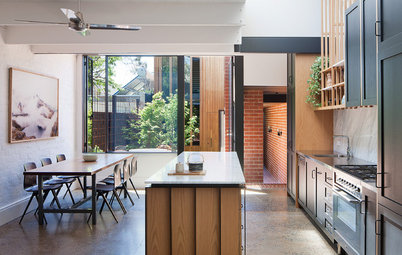
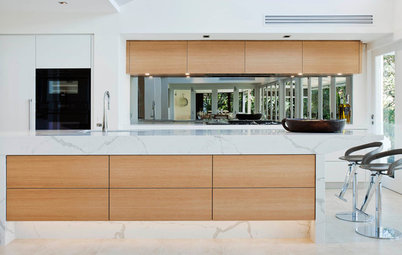
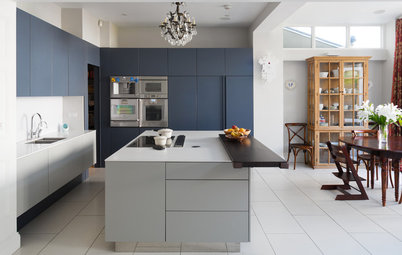
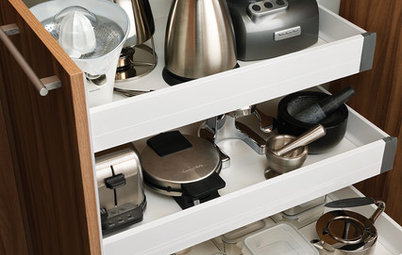
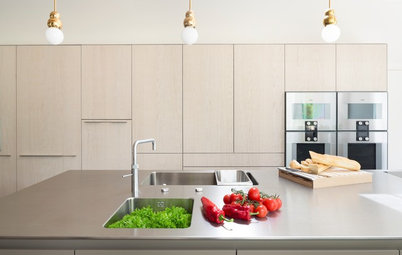
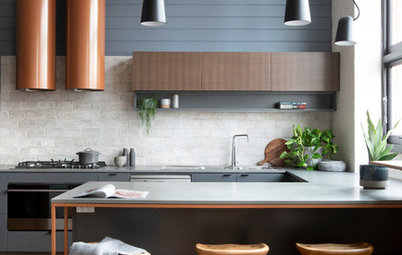
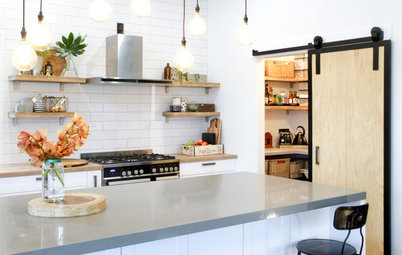
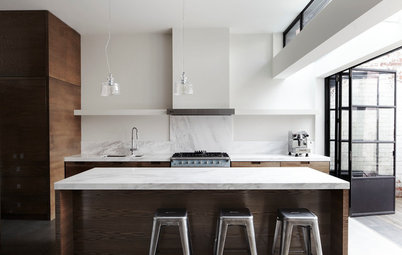
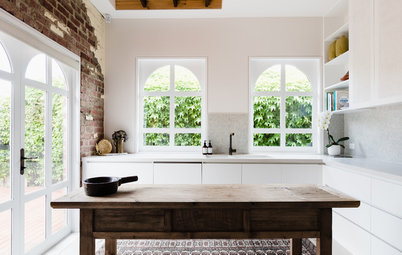
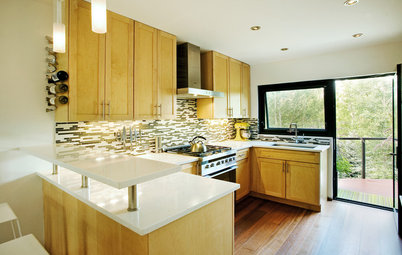
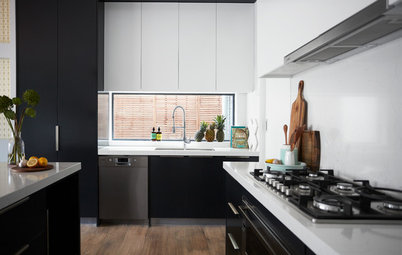
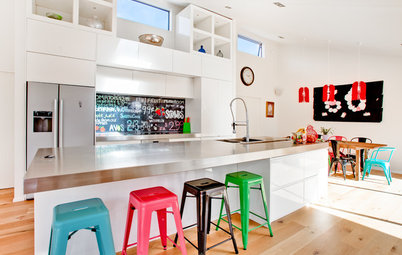
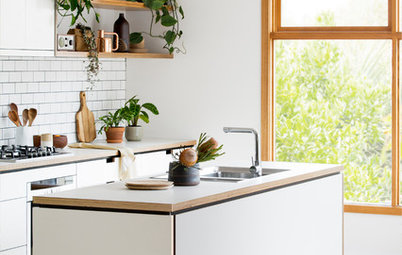

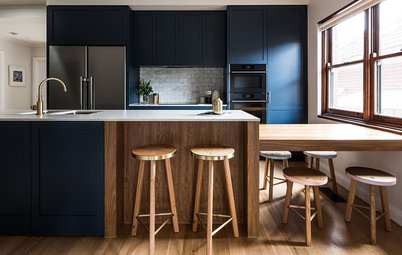

Granite is a beautiful, natural stone that has always been a popular choice for kitchen benchtops, due to its durability, availability and timeless look. There’s a huge choice on the market and each slab of granite has natural variations in colour and pattern, making every piece unique. The availability of a particular colour will depend on what can be obtained from granite quarries around the world.
Expect to pay anywhere from $700 right up to $1,700 per square metre for a new granite benchtop. This includes having your new benchtops templated, manufactured to size and installed by a professional stone mason. Most stone masons will charge a bit extra for an under-mount sink cut-out, due to the extra work involved in polishing the exposed edges. This will set you back around $250.
To complement an under-mount sink, a great addition to any stone benchtop is having drainer grooves routed into the surface so that water runs straight into your sink and doesn’t pool on the benchtop. Adding these grooves is very labour intensive and the process is likely to cost you an additional $350.